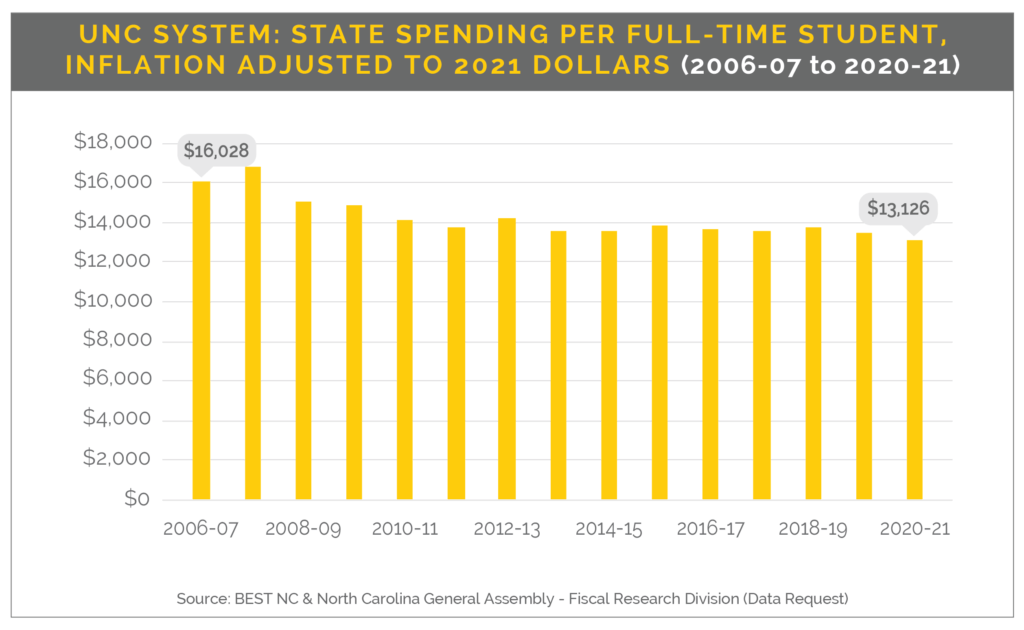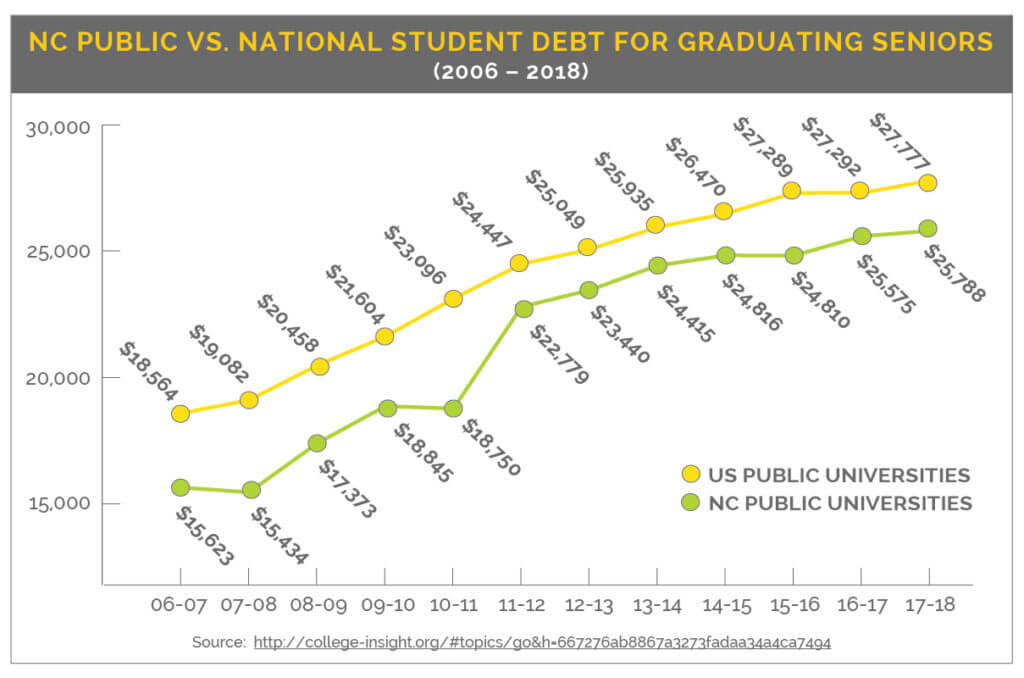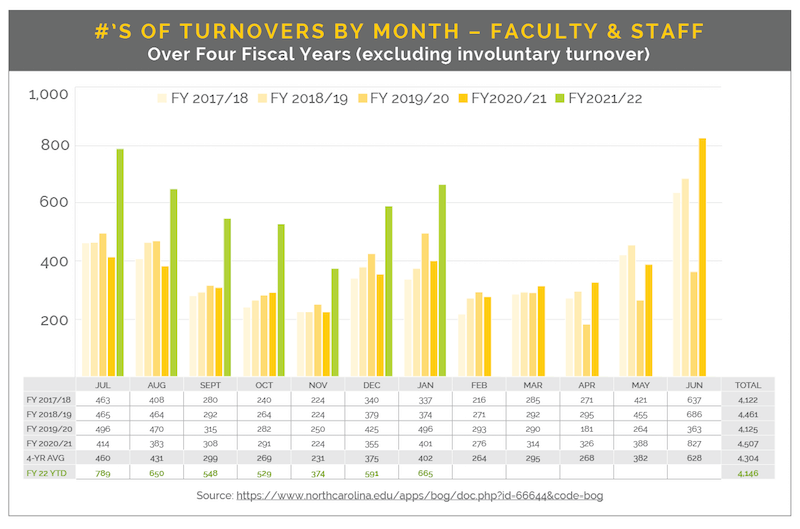UNC System: disinvesting in public universities
Published October 13, 2022
North Carolina has an ambitious goal to have 2 million people ages 25-44 with a college degree or credential by 2030.
Then why do we continue to disinvest in our public universities?
The state spent $2,900 less per student in the University of North Carolina System in 2020-21 than it did in 2006-07, when adjusted for inflation.1 (And that ignores the high-water mark for state support in 2007-08.)

Not all of that $2,900 reduction in state support per student turned into tuition increases – campuses in the UNC System found efficiencies, and they deserve credit for that.
The UNC Board of Governors also deserves credit for holding tuition constant for the past six years – and likely for 2023-24 as well.2
The UNC System has a tradition of low tuition and low student debt. In-state tuition and fees at UNC System schools averaged $7,390 in 2020-21, compared to a national average of $10,740 for four-year public universities, ranking North Carolina 4th-lowest in the nation.3
The NC General Assembly also deserves credit for its $82.5 million commitment to NC Promise, which guarantees in-state students tuition of $500 a semester at Elizabeth City State, UNC Pembroke, Western Carolina and now Fayetteville State University.4 The measure contributed to enrollment increases at all the initial campuses.
YET THERE ARE ALARMING SIGNALS out there.
The incremental reductions in state funding per student continue to shift the burden of financing a college education from the state to students and their families.
This in a state whose constitution says the General Assembly must provide North Carolinians with a college education for “as far as practicable … free of expense.”5
College debt has also risen to the point where the debt owed by more than 1 million North Carolinians6 is approaching the national average, if it hasn’t already surpassed it.

Not only has the amount borrowed grown, but the percentage of students who borrow has grown over time as well: Some 55% of all North Carolina graduates in 2019-20 graduated with an average debt of $29,681.7
Among public universities, that ranged from 36% of graduates at UNC Chapel Hill, who owed an average of $20,563 in 2019-20, to 91% of graduates at NC Central University, who owed an average of $44,312.8
FACULTY ARE THE HEART of any institution of higher education. But starting in June 2021, the UNC System also saw a dramatic increase in employee turnover. The number of resignations and transfers in June 2021 alone was more than double departures in each of the previous 10 months.
There are multiple factors – the pandemic and remote classes, Baby Boomer retirements, inability to reach a state budget agreement in 2019, politicization of the University – but this spike in departures was unlike any seen in the previous four years.

System officials attributed the jump in resignations to the pandemic and the Great Resignation.
But others weren’t so sure.
Kevin McClure, an associate professor of higher education at UNC Wilmington, said other factors include “burnout, demoralization, disengagement,” issues that “have been around a long time and are not going away when the pandemic does. The pandemic revived them.”9
CHANCELLORS ALSO WARNED their governing board that the stresses of flat tuition and inflation are eroding campuses’ ability to attract and retain talent and complete construction projects.
NC State University Chancellor Randy Woodson – not known as a whiner – told the Board of Governors in April that NC State’s buying power was down $50 million due to inflationary pressures.
“We haven’t had a tuition increase for resident students for six years now,”10 Woodson said. “It’s beginning to impact our ability to meet the needs of the state.”
Chancellors from UNC Chapel Hill, UNC Wilmington and UNC Pembroke echoed Woodson’s comments.11
Then, in July, the General Assembly and the governor agreed to give University, Community College and other state employees a raise of 3.5% – less than half the 8.6% rate of inflation at the time, even though the state was sitting on a surplus of $6.5 billion.
It was effectively a pay cut.12
This comes at a time when new employers like Apple, Google, Boom Supersonic, VinFast and Toyota have announced plans to come to North Carolina.
While training for most of those jobs will likely come from the state’s community colleges,13 those companies undoubtedly will need engineers and other employees with four-year degrees as well.
MEANWHILE, THE GENERAL ASSEMBLY plans to spend more than $180 million14 to build a new headquarters for the UNC System, the NC Community College System, the Department of Public Instruction and Department of Commerce across the street from the Legislative Building in Raleigh.15
Plans for the UNC System Office to move from Chapel Hill into rented space in Raleigh while the new building is constructed are already well underway.
That’s a whole lot of coin to keep the universities under the legislature’s thumb.
1 https://www.bestnc.org/wp-content/uploads/2022/07/Facts-Figures-July-2022.pdf, p. 51.
2 https://www.higheredworks.org/2022/02/unc-board-keep-tuition-flat-a-sixth-year/; https://www.higheredworks.org/2022/09/hans-no-unc-system-tuition-increase-in-2023-24/.
3 https://www.bestnc.org/wp-content/uploads/2022/07/Facts-Figures-July-2022.pdf, p. 52.
4 https://www.northcarolina.edu/future-students/nc-promise/.
5 https://www.ncleg.gov/Laws/Constitution/Article9, Article IX, Section 9.
6 https://www.wral.com/with-average-nc-student-debt-nearly-40-000-local-students-react-to-loan-forgiveness/20431047/.
7 http://ticas.org/interactive-map/.
8 https://www.northcarolina.edu/apps/bog/doc.php?id=66644&code=bog, pp. 11-21; https://www.insidehighered.com/news/2022/04/26/unc-faculty-staff-turnover-spikes-spurs-search-answers.
9 https://www.higheredworks.org/2022/05/unc-system-pervasive-and-overtly-partisan-political-control/.
10 Important detail: Under state law, the UNC System has guaranteed tuition. As long as a student stays enrolled and in good standing, the student is guaranteed the same rate of tuition for eight consecutive semesters. So if the UNC System raises tuition, the increase would apply only to incoming freshmen, or roughly one-fourth of the student body.
11 https://www.higheredworks.org/2022/04/bog-inflation-bites-unc-campuses/.
12 https://www.higheredworks.org/2022/07/a-pay-cut/.
13 https://www.higheredworks.org/2022/10/chatham-with-9000-new-jobs-its-a-regional-economy/.
14 https://www.ncleg.gov/Sessions/2021/Bills/House/PDF/H103v4.pdf, pp. 172-174.
15 https://www.higheredworks.org/2022/07/unc-across-the-street/.







